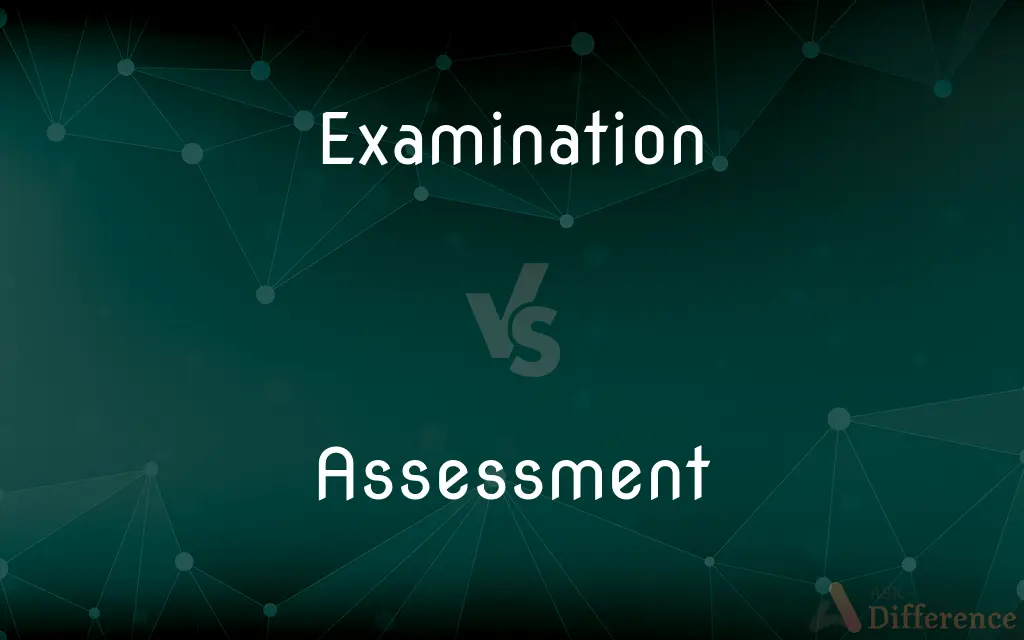Examination vs. Assessment — What's the Difference?
By Fiza Rafique & Maham Liaqat — Updated on March 13, 2024
Examination refers to a formal test of knowledge or ability, often under controlled conditions, while assessment is a broader evaluation of skills, knowledge, or performance, which can encompass various methods and contexts.

Difference Between Examination and Assessment
Table of Contents
ADVERTISEMENT
Key Differences
Examinations are structured tests that usually occur at specific times and places, often in academic or professional settings. They are designed to measure knowledge, understanding, or proficiency in a particular subject or skill, typically through written, oral, or practical tests. Assessments, on the other hand, include a wider range of evaluation methods such as observations, interviews, assignments, and performance tasks, in addition to traditional tests and exams.
While examinations often have a standardized format with clear, predefined criteria, assessments can be more flexible, adapting to the individual's needs, the context, and the specific objectives of the evaluation. This flexibility in assessments allows for a more holistic understanding of a person's abilities or performance.
The purpose of examinations is generally to quantify achievement or competence, often leading to a grade or score. Assessments, however, aim not only to measure but also to inform and guide future learning and development, providing feedback that helps identify strengths and areas for improvement.
The feedback from examinations is usually in the form of grades or scores, which indicate how well the individual has met the specific criteria. In contrast, assessment feedback can be more varied and descriptive, offering detailed insights into performance, understanding, and progress.
Examinations are typically associated with formal education and certification processes, serving as milestones or gateways in academic or professional advancement. Assessments, encompassing a broader spectrum, are used in educational, professional, and personal development contexts to guide decision-making and support growth and improvement.
ADVERTISEMENT
Comparison Chart
Definition
A formal test of knowledge or ability
A broad evaluation of skills, knowledge, or performance
Method
Structured tests (written, oral, practical)
Diverse methods (tests, observations, assignments)
Purpose
To quantify achievement or competence
To measure, inform, and guide learning and development
Feedback
Often in grades or scores
Can be varied and descriptive, providing detailed insights
Context
Primarily academic and professional settings
Used in educational, professional, and personal development
Compare with Definitions
Examination
A formal test measuring specific knowledge or skills.
She passed the final examination with high marks.
Assessment
Evaluates a broader range of abilities.
The teacher's assessment included both tests and class participation.
Examination
Often under controlled conditions.
The examination took place in a quiet, supervised room.
Assessment
Can be formal or informal, structured or unstructured.
Peer feedback was part of the ongoing assessment process.
Examination
Can be a written, oral, or practical test.
The practical examination tested her on real-life scenarios.
Assessment
Aims to inform and guide future development.
The assessment helped identify areas where he needed improvement.
Examination
Serves as a milestone in education or certification.
The board examination is a crucial step for medical licensure.
Assessment
Offers detailed feedback beyond grades.
The assessment report detailed her strengths and weaknesses.
Examination
Results in a grade or score.
His examination results qualified him for the advanced course.
Assessment
Used across various contexts for growth.
The professional development assessment outlined his career progress.
Examination
The act of examining or the state of being examined
The examination of the evidence.
Assessment
The act of assessing; appraisal.
Examination
A set of questions or exercises testing knowledge or skill.
Assessment
An amount assessed, as for taxation.
Examination
A formal interrogation
Examination of the witness.
Assessment
The act of assessing or an amount (of tax, levy or duty etc) assessed.
Examination
The act of examining.
Assessment
An appraisal or evaluation.
Examination
Particularly, an inspection by a medical professional to establish the extent and nature of any sickness or injury.
Assessment
The act of assessing; the act of determining an amount to be paid; as, an assessment of damages, or of taxes; an assessment of the members of a club.
Examination
(education) A formal test involving answering written or oral questions under a time constraint and usually without access to textbooks; typically, a large, written test administered to high school and college students covering course material studied in a semester.
Assessment
A valuation of property or profits of business, for the purpose of taxation; such valuation and an adjudging of the proper sum to be levied on the property; as, an assessment of property or an assessment on property.
Examination
Interrogation, particularly by a lawyer in court or during discovery.
Assessment
The specific sum levied or assessed.
Examination
The act of examining, or state of being examined; a careful search, investigation, or inquiry; scrutiny by study or experiment.
Assessment
An apportionment of a subscription for stock into successive installments; also, one of these installments (in England termed a "call").
Examination
A process prescribed or assigned for testing qualification; as, the examination of a student, or of a candidate for admission to the bar or the ministry.
He neglected the studies, . . . stood low at the examinations.
Assessment
The classification of someone or something with respect to its worth
Examination
The act of examining something closely (as for mistakes)
Assessment
An amount determined as payable;
The assessment for repairs outraged the club's membership
Examination
A set of questions or exercises evaluating skill or knowledge;
When the test was stolen the professor had to make a new set of questions
Assessment
The market value set on assets
Examination
Formal systematic questioning
Assessment
The act of judging or assessing a person or situation or event;
They criticized my judgment of the contestants
Examination
Examination of conscience (as done daily by Jesuits)
Examination
The act of giving students or candidates a test (as by questions) to determine what they know or have learned
Common Curiosities
Why is feedback from assessments considered more detailed?
Because assessments aim to provide a comprehensive view of performance, feedback often includes qualitative insights into strengths, weaknesses, and areas for improvement.
Are examinations always written tests?
No, examinations can also be oral or practical, depending on the subject and the skills being tested.
What is the main purpose of an examination?
The main purpose is to formally test knowledge or skills, often resulting in a grade or score that reflects achievement or competence.
Is an examination a form of assessment?
Yes, an examination is a specific, often formalized method of assessment, focusing on testing particular knowledge or skills.
How does an assessment differ from an examination?
An assessment is a broader evaluation that can use various methods to measure, inform, and guide development, not just through tests but also through observations, assignments, and more.
How do assessments benefit learning and development?
Assessments provide feedback that helps individuals understand their progress, recognize their strengths, and identify areas where they need further development or support.
Can assessments include examinations?
Yes, examinations can be part of a larger assessment strategy, which might also include other forms of evaluation.
What is the importance of standardized examinations?
Standardized examinations ensure uniformity in testing conditions and scoring, allowing for fair comparisons across different individuals or groups.
Can assessments be informal?
Yes, assessments can be informal, such as observational assessments or ungraded feedback, providing insights without formal testing.
What is the value of feedback in the assessment process?
Feedback in the assessment process is valuable for providing actionable insights, helping individuals understand how to improve and where to focus their efforts.
How are assessments used in the workplace?
In the workplace, assessments can be used for performance reviews, professional development, and determining training needs.
How do assessments influence teaching?
Assessments can guide teaching strategies by highlighting areas where learners need more support, allowing teachers to tailor their instruction.
What role do examinations play in education?
Examinations serve as key milestones or checkpoints in educational processes, assessing readiness for advancement or certification.
Are examinations more stressful than other forms of assessment?
Examinations can be more stressful for some individuals due to their formal nature and high stakes, such as passing a course or obtaining certification.
How do assessments contribute to personal development?
Assessments in personal development contexts can help individuals set goals, recognize achievements, and plan for further growth.
Share Your Discovery

Previous Comparison
Polymer vs. Macromolecule
Next Comparison
Cobalt vs. ColtanAuthor Spotlight
Written by
Fiza RafiqueFiza Rafique is a skilled content writer at AskDifference.com, where she meticulously refines and enhances written pieces. Drawing from her vast editorial expertise, Fiza ensures clarity, accuracy, and precision in every article. Passionate about language, she continually seeks to elevate the quality of content for readers worldwide.
Co-written by
Maham Liaqat















































